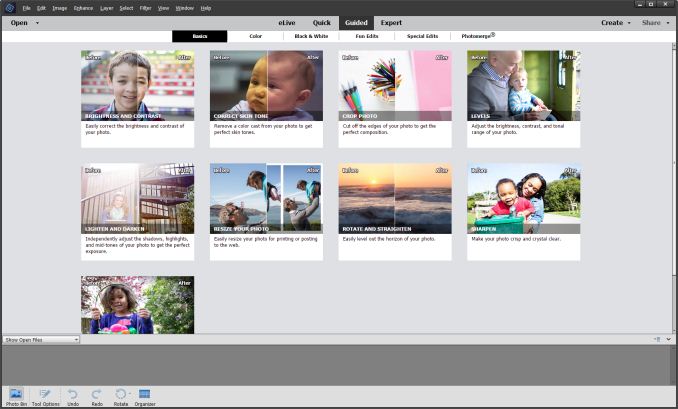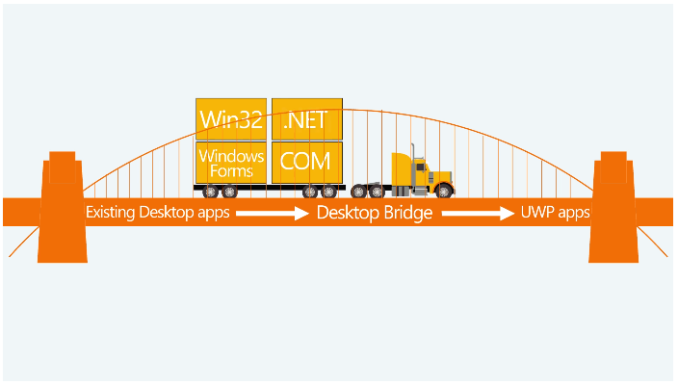Adobe Photoshop Elements 15 Comes To The Windows Store
by Brett Howse on November 25, 2016 11:45 AM EST- Posted in
- Software
- Adobe
- Windows 10

The Windows Store is Microsoft’s big bet, combining software purchases, updates, and installs into a single place. Although it continues to grow, it still doesn’t offer anywhere near the number of big name apps as iOS or Android. Windows still has a massive library of applications, or course, but they are bought, installed, and updated outside of the store.
Clearly one of the ideas is that Microsoft will take a cut on any app sales in the store, so there is motivation for them to make this succeed, but for the end users, it’s been well proven that a solid Store model works for ease of use, and especially updates.
Recently (and possibly today) Adobe Photoshop Elements came to the Windows Store, as pointed out by Paul Thurrott and Windows Central. This is an important app for the Windows Store, where previously only a much lighter version called Adobe Photoshop Express was available. Elements is not the crown jewels of Adobe’s suite, but it’s still an app that many people use.
Although we don’t have official confirmation of this, Adobe Photoshop Elements is almost certainly using Microsoft’s Desktop App Bridge, codenamed Project Centennial. Update 2016-11-28: Microsoft has confirmed this is using Project Centennial. This bridge allows developers to bring older Win32 apps to the Windows Store, and if they so choose, begin to convert them to the Universal Windows Platform. Although Centennial was announced quite a while ago, it wasn’t until the Windows Anniversary Update that Windows had all of the frameworks required. Photoshop Elements certainly isn’t the first Desktop Bridge app to make it to the store, but it’s surely one of the biggest.
By offering this through the Store, end users get the benefits of the store. The app is automatically updated through the store, so you won’t need any Adobe update services running on your PC, and best of all it can be installed on up to ten devices, rather than the two activations that you would get if you purchased this as a traditional software download.
Centennial also packages the app into a container, so the install process is incredibly quick. Elements doesn’t need to install for thirty minutes as it writes files all over your PC, and in your registry. Everything is kept in the container, which also makes uninstall very simple and much cleaner. I just installed Elements, and after the download was complete, it installed in just a few seconds.
With the launch, the software is also on sale for a limited time.
If the Windows Store is going to take off in a meaningful way, apps like these are going to be an important first step. With Windows 10 on over 400,000,000 devices now, there is an incentive for developers to leverage tools like the Desktop App Bridge to utilize the store. For me, the Store model has enough benefits that I would prefer to purchase an app like this through it. It’s worked before on the PC with stores like Steam and Origin as well, and by bringing big name Win32 apps to the store, Microsoft has an important tool to bring existing devs into their new platform.
Source: Windows Central, Thurrott.com











56 Comments
View All Comments
Penti - Sunday, November 27, 2016 - link
As far as I know it's just a virtualized Win32-app. You can't really mix it in with UWP yet, but still has a lot of limitations.ddriver - Sunday, November 27, 2016 - link
Keep dreaming LOLsadsteve - Saturday, November 26, 2016 - link
Way too late (not that I'd buy Elements since I already have Photoshop CS6). When Windows 8 first came out, I started perusing the Windows Store. I'd checked weekly, for 2 years, looking for any App I'd want to use over an existing Win32/64 application I already used. Never came across one so I stopped looking.BrokenCrayons - Monday, November 28, 2016 - link
Microsoft has a history of being quick to abandon unprofitable ventures. There was once a Gates/Ballmer era rule of thumb that I recall hearing from the mouth of one of those two horses in a MS business strategy discussion webcast. The rule was they'd attempt to make a product profitable through its initial and one subsequent iteration before dropping it and moving on. To date, I think Windows Mobile and Windows Phone are the only product stacks I can think of offhand that break that rule, but for obvious reasons that exiting completely from mobile computing is a dangerously foolish move even if business is prone to losses. They certainly exited the residental wireless networking hardware business pretty quickly after their 802.11b and subsequent 11g products failed to really take off. I had one of their 54mbps 11g MS-branded routers until it finally died in 2012 and I was too lazy to open it up to repair the power connector.Anyway...rambling aside, I think the Windows Store is another one of those ventures that's similar to mobile computing. Even if the Windows Store remains a mediocre or somewhat unprofitable venture, Microsoft will probably continue to operate it because their nearest competitors are doing so successfully and they can't afford not to have a competing service of some sort in order to prop up their core, profitable products.
0iron - Sunday, November 27, 2016 - link
It's better to write 400 million rather than 400,000,000Adobe Support - Friday, July 27, 2018 - link
Adobe technical support delivers instant and reliable Adobe solutions to every user. Adobe Technical Support products are Photoshop, Flash player, PDF Reader, Shockwave Player by Adobe Customer Support.Visit: https://www.adobesupportphonenumber.com/adobe-tech...